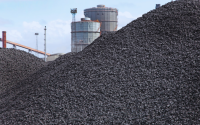Recent reports indicate that the rains have failed once again across vast swathes of Eastern Africa, putting millions of people at risk. This current regional crisis is a stark reminder to all of us that the global food security crisis of 2007 and 2008, which was marked by a sharp contraction in food supplies and food price spikes, is far from over. Food prices have come down from their peaks of 2008, but they are still at historically high levels. They have become more volatile, indicating underlying uncertainties, and are showing signs of rising again.
Kanayo F. Nwanze
IFAD President
10/11/2009
The future of global food security is highly dependent on two important and inter-related factors. The first is the degree to which developing countries will succeed in raising agricultural productivity through technological change and effective natural resource management. The second is the degree to which the world will succeed in limiting climate change, while helping developing countries adapt to climate change and mitigate its effects.
The scale of the challenge of assuring global food security is reflected in current projections for population growth, and the accompanying projected growth in the demand for food. On current trends, the world’s population is projected to swell from 6.8 billion to 9.1 billion by 2050. Most of the growth, as can be expected, will occur in developing countries. Feeding 9.1 billion people will require that overall global food production grow by 70 per cent. Production in the developing countries will need to almost double.
The enormous burden of feeding a growing global population is made heavier by the expected adverse impact of climate change on food production. Recent studies and projections paint a dire picture. In Eastern and South Asia, climate change is expected to affect rains, increase the frequency of droughts, and raise average temperatures, threatening the availability of fresh water for agricultural production. In sub-Saharan Africa, arid and semi-arid areas are projected to increase significantly. And in Southern Africa, yields from rain-fed agriculture are expected to fall by up to 50 per cent as early as 2020.
The impact of climate change on agriculture is therefore likely to lead to a loss of stability in productivity and an overall decline in food production. Unless urgent action is taken, climate change will undoubtedly worsen global food security and dramatically increase the number of people facing hunger and malnutrition. Current estimates indicate that climate change could put 63 million more people at risk of hunger by 2020.
The international community is squaring up to these challenges and is laying the groundwork to support low-income countries in their drive to boost agricultural production. The L’Aquila Food Security Initiative represents the most important step in this regard.
Such efforts must necessarily focus on the 500 million smallholder farmers worldwide who currently support around 2 billion people, or one third of the world’s population. Increasing their productivity is essential not only to secure the food and nutrition needs of these farmers, but also of the millions of people who depend on them.
The recent global food security initiatives must be complemented by concrete steps to limit climate change if their goals are to be met. It is therefore vital that at Copenhagen negotiators indeed ‘seal a credible climate deal’. I hope that the agreement not only delivers cuts in emissions, but also recognizes the close and unique relation between food security and climate change.
In its 30 years of work, the International Fund for Agricultural Development (IFAD) has supported smallholder farmers with the aim of raising their productivity and their incomes, thus improving their food security. Such support has included a wide variety of interventions including agricultural research and extension; farmer field schools; farm input supply; forestry; veterinary services; support to farmers’ organizations and cooperatives; as well as support to rural finance institutions. In recent years, IFAD has expanded its programmes to help smallholder farmers adapt to climate change by making available, for example, improved seeds that are more resistant to drought or to floods.
These programmes have shown the enormous potential of smallholder farmers to increase food production and follow environmentally sound practices. Smallholder farmers will undoubtedly play a major role in improving global food security. Yet, if their potential is to be realized, their efforts must be complemented by effective measures to limit the potentially devastating effects of climate change.
About IFAD’s PresidentKanayo F. Nwanze began his term as IFAD’s fifth President on 1 April 2009. A Nigerian national, Nwanze has a strong record as an advocate and leader of change and a keen understanding of the complexity of development issues. He will be attending COP15, and will be a keynote speaker during the Agricultural and Rural Development Day on 12 December.
For more information on IFAD and its work visit www.ifad.org






